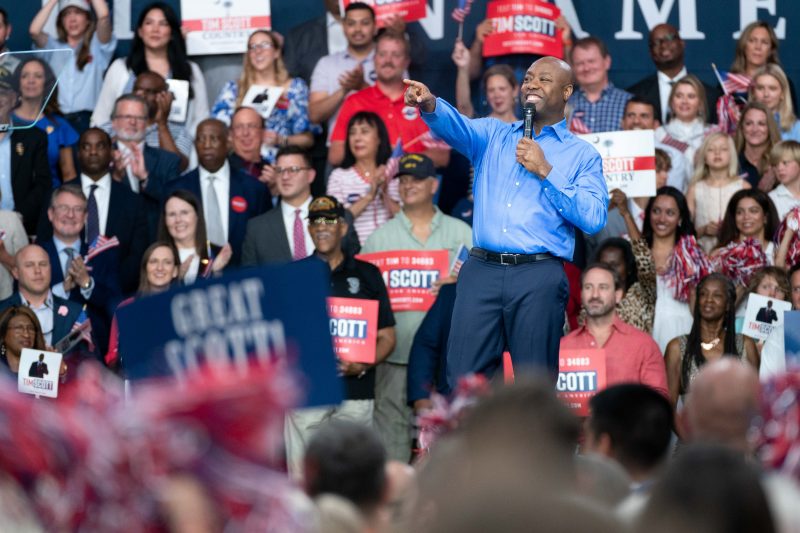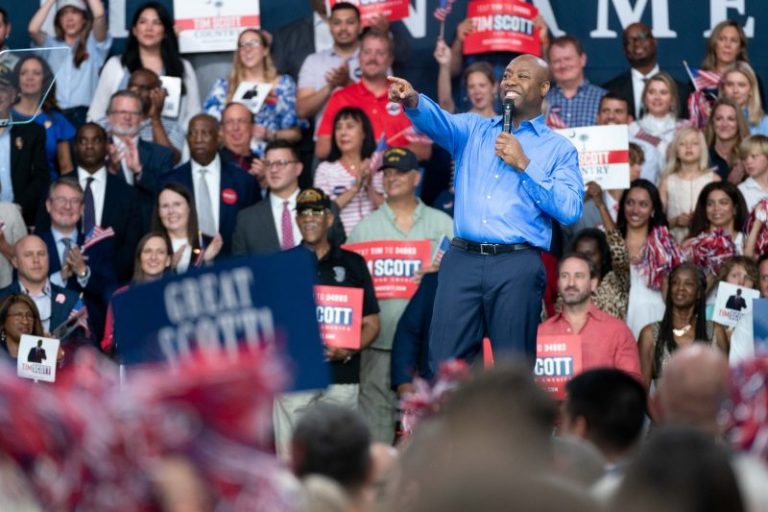
His fellow Republican colleagues can’t say enough good things about Sen. Tim Scott (R-S.C.).
“He’s admired by both sides of the aisle here,” Sen. Thom Tillis (R-N.C.) said Thursday.
“Tim Scott is very much appreciated and loved,” Sen. Mitt Romney (R-Utah) said Wednesday.
“I think the world of Tim Scott,” Sen. John Barrasso (R-Wyo.) said earlier this spring.
Yet none of them has actually endorsed Scott’s bid for the 2024 presidential nomination. Almost a month since formally entering the race, Scott has just two colleagues backing his bid: South Dakota Sens. Mike Rounds and John Thune.
All told, 35 Senate Republicans remain on the sidelines of the 2024 contest, more than 70 percent of the caucus, and it’s crystal clear that many are paralyzed by the fear that former president Donald Trump might seek revenge if they publicly support someone else.
Today’s Senate GOP ranks are adrift in a broader Republican realignment in which their traditional conservative ideology feels increasingly marginalized. They don’t comport with Trump’s America First worldview calling for a retreat from global leadership and opposing the strong defense of Ukraine against Russia. In their last legislative act during his presidency, 40 Senate Republicans joined 41 Democrats to override Trump’s veto of the 2021 Pentagon policy bill.
A few days later, 43 GOP senators voted to affirm President Biden’s 2020 election, while only eight objected. So far, just 10 Senate Republicans have endorsed the ex-president’s bid to return to the White House.
While most were too afraid to convict him during his 2021 impeachment trial, many GOP senators believe Trump is a political anchor weighing down their party’s chances of winning the majority.
In Scott, they have a candidate whose personal story and policy beliefs fit what the traditional GOP’s messaging has been preaching for decades: He grew up in a single-parent home and overcame poverty to eventually make history as the first Black Republican elected from the Deep South to the Senate, where he’s championed free-market principles for conquering economic hardship.
Yet only Thune and Rounds have stepped forward to endorse Scott. And North Dakota’s senators, Kevin Cramer and John Hoeven, are the only other Senate Republicans to endorse a candidate not named Trump, bowing to tradition in support of their state’s governor, Doug Burgum, who has little name recognition and is a very long-shot bid.
“A lot of them, they don’t want to get on the wrong side of Trump,” Sen. Lindsey O. Graham (R-S.C.) said Thursday, laughing out loud about how often that happens.
What about Scott? “Tim’s a great guy,” Graham said.
Apparently, not great enough for him to endorse his home-state colleague. Graham, who prides himself on defending the military, is going with Trump despite the ex-president’s opposition to defending Ukraine, and even though Scott’s anti-Russia position is more closely aligned with Graham’s on what he considers a critical national security issue.
“I’ve got a bunch of friends in this race — and I just jumped in the deep end of the pool with Trump because I think he deserves another shot,” Graham said.
Thune is aware that many Senate Republicans are looking over their shoulder to see if a Trump-inspired challenger is lurking.
“There’s some primary politics there,” he explained.
Rounds and Thune, having won reelection in 2020 and 2022, respectively, need not worry about a primary for several years. They followed their heads and their hearts to endorse the candidate who they think best represents their own views and has the chance to actually win the general election.
Rounds sat next to Scott on the Senate Banking Committee for years, Thune worked closely with Scott on the Finance Committee’s 2017 tax-cut legislation.
When it became clear Scott would jump into the 2024 race, Thune asked Rounds what he thought.
“I think he’s the right guy for the job, positive. He’s the closest to a [new] Ronald Reagan, in terms of his excitement, his ability to communicate, his forward-thinking, his understanding of defense issues, his understanding of business,” Rounds recalled telling Thune.
Then he added one extra incentive. “None of us are ever going to be ashamed of supporting him,” Rounds said.
Officially, Scott’s campaign remains happy with the endorsements that he has racked up so far, with a deeper emphasis on state and local officials who are closer to grass-roots activists who can turn out voters in primary elections. On Monday, he rolled out 140 current and former officials backing Scott from his home state, which is a crucial early primary and the first political test in the South.
Yet Scott hasn’t scored one endorsement among South Carolina’s six House Republicans, its other senator or Gov. Henry McMaster (R).
McMaster, Graham and three GOP congressmen back Trump, while Rep. Ralph Norman (R-S.C.) supports former governor Nikki Haley.
“We came to Congress the same year. We were roommates for a little over three years here and when we first got here. He’s a dear friend,” Rep. Jeff Duncan (R-S.C.) said of Scott. “I’m excited about him being in the race and I think his message is one America needs to hear.”
Duncan considers several others in the race as friends and plans to stay out of the primary. Rep. Nancy Mace (R-S.C.) remains officially neutral but often praises Haley.
Some GOP senators see Scott as strategically trying to avoid looking like an establishment favorite. “He has not asked for endorsements,” Romney said. “He has not come to our group and said, ‘Hey, everybody help me.’”
Romney acknowledges that the “endorsement primary” mattered during his 2008 and 2012 presidential bids.
“That was the old days. Donald Trump got no endorsements when he ran the first time and won the nomination,” Romney said. “So it’s like, okay, do you want to look like you’re the one that has all these endorsements? No, you want to look like you’re the fighter from the outside.”
Some Republicans want to see how the campaign unfolds before tipping their hand. “I’m going to wait and see where they are with messaging after the first debate,” Tillis said. “Generally speaking, I may not get in the primary, but if there’s a very clear difference, and one that makes a difference in North Carolina doing its part on the electoral map, I’ll consider that later.”
Some Republican senators understand that, in terms of appealing to the conservative activist types, they are persona non grata.
“I’m just simply not going to comment on the candidates. We’ve got a bunch of them and I’m just simply gonna stay out of it,” Senate Minority Leader Mitch McConnell (R-Ky.), a frequent target of Trump’s ire, told reporters on Wednesday.
“My endorsement would be a kiss of death, quite literally. Well not literally, but figuratively,” Romney joked.
It’s true that Trump obliterated the early-endorsement favorite in the 2016 campaign, former Florida governor Jeb Bush. But it’s also true that the Republican establishment then never coalesced around a backup alternative to Trump.
Some big-name Republicans, including Scott and Haley, drifted to Sen. Marco Rubio (Fla.) as the sort of next-generation Republican who could speak to a diverse nation. Others, including Graham, who originally loathed Trump, rallied to Sen. Ted Cruz (R-Tex.) hoping that his staunch conservatism could peel off some of Trump’s support from those voters.
Instead, Trump marched to the nomination on the back of a divided GOP establishment. He won most states with a plurality as the vote totals of Cruz, Ohio Gov. John Kasich and Rubio usually combined for a greater tally.
In 2016, Thune and Rounds sat out the competitive phase of the GOP primary and endorsed just before Trump easily won South Dakota’s June primary. Thune revoked his endorsement that fall after The Washington Post published Trump’s comments bragging about assaulting women when he was a reality TV star.
Thune and Rounds tried to accommodate Trump as president, happily supporting his tax-cut agenda and his Supreme Court choices. They voted to acquit in both impeachment trials, but have increasingly opposed his more recent legal and political travails.
So they decided not to sit this one out.
Thune said his pitch — “in subtle and not so subtle ways” — to his Senate colleagues focuses on potentially broad appeal: “Optimism, hope, aspirational.”
He’s also reminding colleagues how Trump and nominees embracing his approach have lost in the critical battleground states and left the GOP in the minority in the Senate.
Rounds still believes that endorsements can matter, especially for such a little-known figure like Scott. If enough senators get behind him and introduce him to their state’s voters, it might change things.
“The more of us who say we know him, we know him personally, and we think he would be a great president, maybe that starts to turn it to where more people actually take the time to look at him,” Rounds said.


Comments are closed.